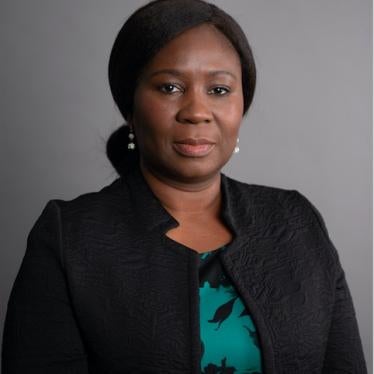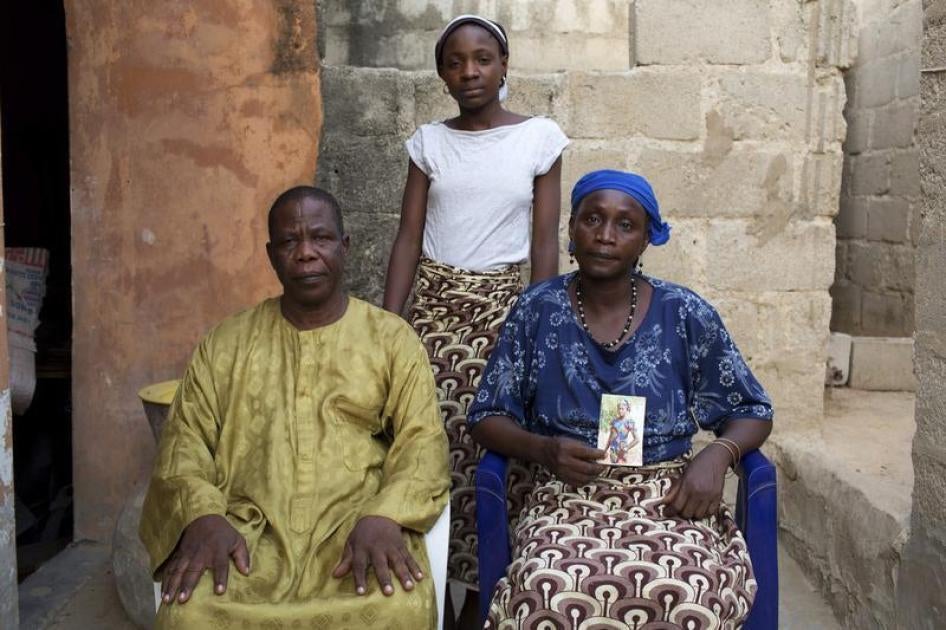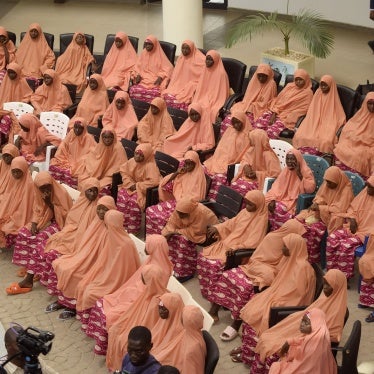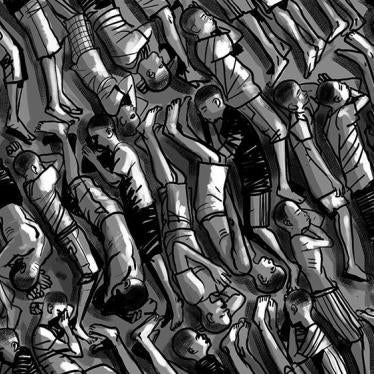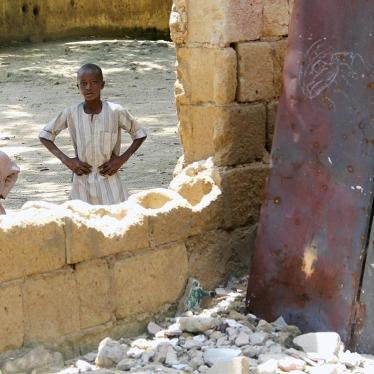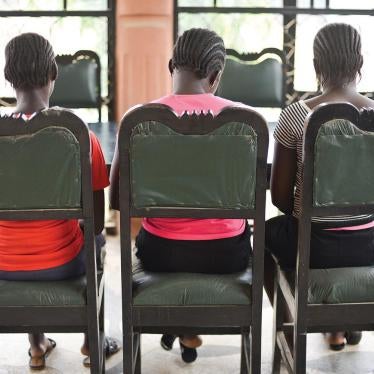On the night of April 12, 2014, 14-year-old Miriam was jolted from sleep by the sound of a door being kicked in. She knew what it meant: Boko Haram had arrived. She dove under a pile of clothes in a corner of her room and watched as armed men dragged her father and her two teenage brothers out of the house. The rapid gunfire that followed told her that they were dead.
The men then returned for Miriam, her mother, and her five-year-old brother. Scores of other young women and girls from her village, six other young boys, and Miriam were forced into waiting vehicles. As they drove out of the village, she wondered if she would ever see her home again.
Miriam, whose name has been changed to protect her privacy, lived in the village of Marnaghafai, in northeastern Nigeria, where the militant Islamist group Boko Haram has operated since 2010. The group has killed an estimated 8,000 civilians, and another one million people have been forced to flee their homes. Since last year, the group has expanded to Cameroon, Chad, and Niger and has pledged allegiance to the self-proclaimed Islamic State (also known as ISIS). The Boko Haram hallmark is brutal violence: suicide bombings, mass murder, forced conscription of young men and boys, and the destruction of villages, towns, churches, markets, and schools.
But Boko Haram is perhaps best known for its widespread abduction of women and girls—an estimated 2,000 since 2009. The captives are raped, forced to marry Boko Haram fighters and convert to Islam, and, sometimes, brainwashed to become suicide bombers. The captives include the 276 schoolgirls from Chibok, whose abduction on April 14, 2014, sparked the #BringBackOurGirls campaign and galvanized global outrage.
Last week, Nigeria’s newly elected president, Muhammadu Buhari, visited Washington to meet U.S. President Barack Obama and other U.S. officials to strengthen bilateral cooperation against terrorist groups such as Boko Haram. Solutions are desperately needed, but the U.S. government will need to outline clear benchmarks for any financial and military support to ensure that Nigeria’s response to Boko Haram protects human rights.
Far too often, Nigerian forces have been implicated in grave violations of human rights, including incommunicado detentions, extrajudicial killings, and enforced disappearances. The Nigerian police have also been implicated in several highly publicized extrajudicial killings of Boko Haram members or suspects. Almost no one has been held to account for these crimes.
Until recently, the Nigerian military also did little to rescue abducted women and girls. The announcement in late April that Nigerian military authorities had “rescued” 293 women and girls from Boko Haram’s Sambisa Forest camp was the first time that families allowed themselves to hope that Nigeria’s security forces might bring back their relatives. More rescues followed. As of June, Nigeria’s military claims to have found about 1,000 women and girls, although the schoolgirls from Chibok remain in captivity.
Miriam was among those rescued from the Sambisa camp. After being held captive for more than a year, she lived for a few weeks with a group of 275 women and children in a displaced persons camp in Malkohi, in the state of Adamawa.
I met Miriam when I visited the camp in mid-May. She and others described their time in captivity, during which they were forced to move around repeatedly as Boko Haram sought to escape approaching military forces. Often, they walked for days without food or water. Several fellow captives died.
Some of the captives had yielded to brutal and sustained pressure to marry the insurgents. Twenty-year-old Falmata, whose name has also been changed to protect her privacy, said, “When our abductors asked me to marry one of them, I refused and told them that as a Muslim, I must mourn my husband, whom they killed with all the other men in my village. How could I marry any of such wicked men?” She saw the preferential treatment the Boko Haram wives received, but, she said, “I stood my ground. I could not betray my husband by marrying his killers.”
Older women in the camp, including Miriam’s mother, were released without explanation four months into their captivity. But Miriam was not so lucky; she endured eight more months of relentless daily beatings meant to pressure her into marrying one of the insurgents. She never gave in.
Other women were similarly tortured. In Bita, a settlement in Borno state, Boko Haram fighters imprisoned women and girls for “offenses” they had allegedly committed in captivity, including quarreling and attempting to escape. The makeshift prison, which held at least 30 women and girls, was a crashed airplane that the fighters called “Handak.” Balaraba, 36, whose name has been changed to protect her privacy, told me that she was released from the makeshift prison only after she helped a young woman, a “wife” of a Boko Haram fighter, safely deliver her baby.
When the Nigerian military began to advance on Bita in early April and several rockets hit the area, Boko Haram fighters moved the camp and their captives to the Sambisa Forest. But soon the military moved into the forest as well.
In disarray, Boko Haram fighters ordered the captives to flee with them. When many refused, the fighters pelted the captives with stones. When the Nigerian army drove at high speed into the camp, the women, girls, and many children cowered underneath trees, shrubs, and any other cover they could find.
“The noise of the vehicles added to the sounds of gunfire was terrible,” 16-year-old Faith said. “We could only hide in fear.” Children separated from their mothers sought desperately to find them; some were killed in the crossfire. Others were run over by Nigerian military vehicles. Faith survived only because she was quick enough to dive out of the way of a fast-moving truck. Her 18-year-old sister, known as “Baby,” was not so lucky. A military truck crushed and killed her.
None of the women and girls I interviewed recalled hearing any instructions from the Nigerian military about where to seek safety or how to get out of the way of danger.
For the rescued, there was relief, but there was also guilt. Fifteen-year-old Talatu told me she felt ashamed that she had survived four months of captivity when her three-year-old sister had not. Just weeks before she was rescued, fighter jets dropped bombs near where Talatu and a group of 60 women and girls were taking shelter after Boko Haram fighters had abandoned them. Some of the bombs’ fragments hit Talatu’s little sister, who died from the wounds.
At the Malkohi camp, the rescued women and children were receiving a range of medical, psychosocial, and nutritional help from several local and international aid organizations. Many of the women and girls were excited to have made contact with family members and hoped to return home.
But about a week after my visit, Nigerian soldiers moved the women and children to a military base in Kaduna, north of Abuja. Miriam was moved, too. When I contacted camp officials to find out why the group had been moved, I was told it was a “purely military affair.” Media reports quote unnamed government officials saying they suspected that some of the women and girls might have maintained contact with Boko Haram members.
The rescued women and girls are now undergoing trauma counseling under the Countering Violent Extremism Programme of the Office of the National Security Adviser, a part of the Nigerian government's approach to combating terrorism. A Nigerian activist who was granted rare access to the facility said that the former captives, 201 of them younger than ten, were undergoing a program of so-called deradicalization.
Former Boko Haram captives undoubtedly need medical and psychosocial assistance, but it is crucial to respect their rights during the process. Despite my repeated inquiries to the government and the military, I have yet to learn if the women and children are free to leave the government’s facility or if they are being compelled to remain there. Nor have I received answers to my inquiries as to whether they have been charged with any crimes, how long they must participate in the deradicalization program, or how they will be assisted if and when they return to their home communities.
For its part, Washington should urge Nigerian authorities to step up efforts to protect captives during military operations against Boko Haram and to be transparent in their handling of the rescued victims. Otherwise, Nigeria risks further traumatizing the women and children who have already suffered so much.
It remains to be seen whether women and girls like Miriam will ever return home. As with many who were taken by Boko Haram, her ordeal is not yet over.
